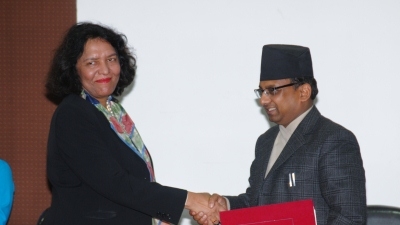Government of Nepal and the World Bank sign two new project agreements
KATHMANDU, April 30, 2013 – The government of Nepal and the World Bank signed two new project agreements today for a combined value of $77.6 million.
The agreements were signed by Finance Secretary Mr. Shanta Raj Subedi and Ms. Tahseen Sayed, World Bank Country Manager for Nepal. Senior government of Nepal officials were present on the occasion.
The $46.6 million Nepal Agriculture and Food Security Project (NAFSP) targets the poorest and most vulnerable population groups in the mid- and far-western regions of Nepal with a view to improve food and nutrition security as well as livelihood opportunities. It recognizes that unlocking the challenges of food security lies not only in increasing food availability but also in addressing health issues, particularly of pregnant and nursing women.
Climate change is another important consideration in NAFSP. Nepal ranks as the 4th most climate-vulnerable country in the world and is highly exposed to a range of water related hazards such as floods and droughts, changing weather patterns, shifting corridors, species migration, and changes in pest dynamics. Current climate projections predict increased climate variability and increased frequency and higher intensity of extreme events. And the most vulnerable populations are the smallholder farmers who are not yet equipped to mitigate or adapt to the impact of climate change. In this context, NAFSP, by identification and promotion of drought tolerant crop varieties and resilient livestock breeds will contribute directly in mitigating the effects.
“Strengthening climate resilience, building adaptive capacity and improving food and nutrition security, especially for at-risk women, are key pillars of the World Bank’s development partnership with Nepal,” said Ms. Sayed. “I am pleased that the agricultural food security project will reach out to over 45,000 pregnant and nursing mothers in nearly 100,000 households in the mid and far western region.”
The $31 million Strategic Climate Fund Grant and Loan agreement for the Building Resilience to Climate-Related Hazards (BRCH) project aims to transition Nepal’s hydro-meteorological services into a modern service-oriented system that will build resilience today as well as adaptive capacity for the future. It intends to enhance government capacity to mitigate climate related hazards by improving the accuracy and timeliness of weather and flood forecasts for disaster preparedness by the general population and warnings for climate-vulnerable communities. The project will also support agricultural management information system services to help farmers mitigate climate-related hazards.
Recognizing the high levels of exposure to climate change risks, in 2009, the Climate Investment Funds (CIF) selected Nepal as one of nine pilot countries for the Pilot Program for Climate Resilience (PPCR). The World Bank is an implementing agency of the CIF. Nepal’s Strategic Program for Climate Resilience (SPCR) was developed by the government of Nepal in partnership with the Asian Development Bank (ADB), the International Finance Corporation (IFC) and the World Bank. The BRCH project is one of five projects identified as part of Nepal’s SPCR.

